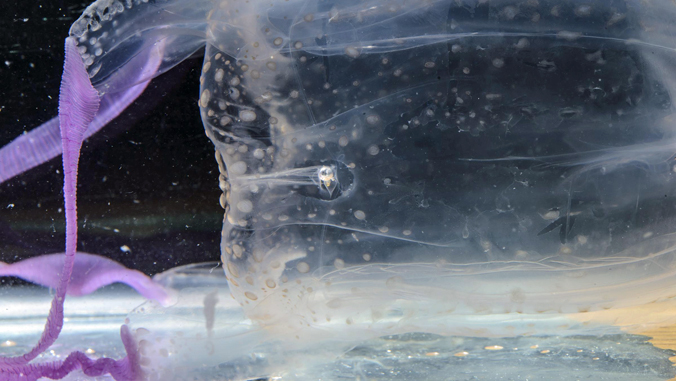

Angel Yanagihara, one of the world’s foremost experts on jellyfish, has started a six-week post as a U.S. State Department Fulbright Specialist to collect lethal box jellyfish in Thailand and train researchers on how to best treat the gelatinous creature’s stings.
“Numerous recent lethal and life-threatening stings by box jellyfish species in Thailand are a source of deep concern to national leaders in the Thai Ministry of Health,” said Yanagihara, an associate research professor at the University of Hawaiʻi at Mānoa John A. Burns School of Medicine and Békésy Laboratory of Neurobiology in the Pacific Biosciences Research Center at the School of Ocean and Earth Science and Technology.
Her expertise and innovative technologies were specifically sought out in the newly approved Fulbright project proposed by researchers at Thailand’s Faculty of Medicine Ramathibodi Hospital at Mahidol University. Fulbright Specialists engage in collaborative projects that focus on unmet needs and challenges, and build and strengthen capacity in curriculum and faculty development at institutions of higher education in more than 100 countries.
Previous collaboration in Thailand
In November 2015, Yanagihara conducted box jellyfish field research in the Gulf of Thailand and presented her findings to the Ministry in Bangkok, as well as her research related to management of life-threatening box jelly stings. She was subsequently invited by Nuankanya Sathirapongsasuti of the Department of Translational Medicine at Mahidol University to return and continue collaborative field surveys in 2017.
During that effort, Yanagihara and her team successfully captured multiple box jellyfish species, including a notoriously lethal, basketball-sized chirodropid species in just two feet of water and only 20 feet from the site of a death of a child, who died less than an hour after being stung by a chirodropid species box jellyfish.
“In-depth studies of live tentacles from lethal box jellies are key to understanding the mechanistic basis of these acute deaths and informing first aid and supportive care,” she said.
In addition to field work, Yanagihara trained in-country students, researchers and physicians in techniques she developed to assess the activity of live box jellyfish tentacles and to test potential mitigation approaches with an in vitro blood agar tissue model, an extension of her recent peer-reviewed publications using this model to examine Australian Chironex box jellyfish envenomation.
Upcoming fieldwork and training
During her six-week post as a Fulbright Specialist, which started August 27, Yanagihara will continue work in field ecology to identify and collect lethal box jellyfish. She will also provide bioassay training, which determines the biological activity or potency of a substance, as well as more in-depth training to Thai researchers in optimizing methods of box jellyfish venom recovery and purification.
Mahidol is Thailand’s premier research university with a long history of expertise in snake venom work and a deep focus on translational medicine. With assistance from compounding pharmacists at the UH Hilo Daniel K. Inouye College of Pharmacy, Yanagihara has developed topical venom inhibitor formulations that are now fully commercialized and available as over-the-counter spray and cream formulations. The efficacy of these formulations to address in vitro live chirodropid tentacle sting tissue damage will also be investigated during this project.
With this Fulbright position, Yanagihara hopes to contribute to the understanding of the identity of the various species that can inflict lethal stings as well as to develop useful first-aid and management tools for these extremely challenging stings.
UH News video on Yanagihara’s research
New experiments determine effective treatments for box jelly stings, January 19, 2016
Box jellyfish research breakthrough by Mānoa biochemist, December 12, 2012

